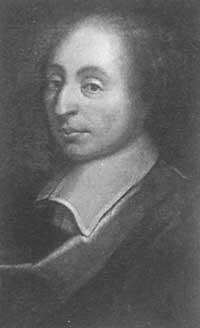Blaise Pascal
Elhuyar Fundazioa
Mathematician and physicist born in the city of Cler-mont-Ferrand de Auvergne on June 19, 1623. As a young man, his father promised to learn classical languages and prohibited him from learning mathematics.
As a young man Pascal was also very fast and on one occasion asked what geometry was. They replied that it was a science that studied forms and images. His brother pointed out that only he discovered the twenty theorems of Euclid. His father, then a mathematician and government official, gave his son permission to study mathematics.
At seventeen he published a book of mathematics, analyzing the conics. The scientists of that time explored the book accurately, and Descartes, for example, did not believe that it was the work of a seventeen-year-old boy.

When he was 19 years old, to help his father, he manufactured the first gear calculator that automatically performed sums and subtraction. His official father had to do many operations to pay wages to the soldiers and he was provided with calculations with his son's machine. Therefore, current cash registers are children of the Pascal machine.
Pascal had a card exchange with mathematician and lawyer Fermat and between them they solved the problems presented to them by a gentleman player and a philosopher. The knight, throwing three data in the game, betting on some combinations, lost it. The two mathematicians (Fermat and Pascal) studied the problem and, incidentally, created a modern theory of probabilities.
Probability theory was of great importance in the field of mathematics (and in science in general), as it somehow compensated for the absolute tendency to absolute certainty.
Two centuries later, another mathematical physicist (Maxwell) applied this theory to the behavior of matter and made considerations about the invisible, insecure and unpredictable motion of atoms.
Pascal also dealt with physics. Study of fluid behavior. He discovered that the pressure exerted on the surface of a fluid was transmitted to all the fluid that is in the container and that acts perpendicular to the walls of the container. This phenomenon is known as the Pascal principle and is the basis of the hydraulic press.
If we put a force on a small plunger on a container edge, the pressure extends to the entire fluid and raises the larger plunger located at the other end of the container. But due to the little force exerted on the small plunger, the large plunger becomes stronger.
Pascal, following Torricelli's ideas, also took care of the weight of the atmosphere. If the atmosphere had weight, as the weight increased it was less, as each time there was less air up. The barometer showed how the weight of the atmosphere was reduced.
Pascal was a chronic patient. I always had headaches and digestion problems. He was not, therefore, able to ascend to the heights, but sent his brother-in-law with two barometers of mercury invented by Torricelli to the top of the Puy de Dôme. When the brother-in-law reached an approximate height of one and a half kilometers, in the mercury columns the level was already seven and a half centimeters below.
Pascal repeated Torricelli's rehearsal with red wine. Since wine is lighter than water, it had to use a glass tube 18 meters high.
In 1646 Pascal became a jansenist. Retired to the convent of Port-Royal in 1655, he wrote Les Territorio (in favor of Jansenism and against the Jesuits) and Pensées. In the following century these works had great influence on Voltaire.
Blaise Pascal died in Paris on 19 August 1662.





